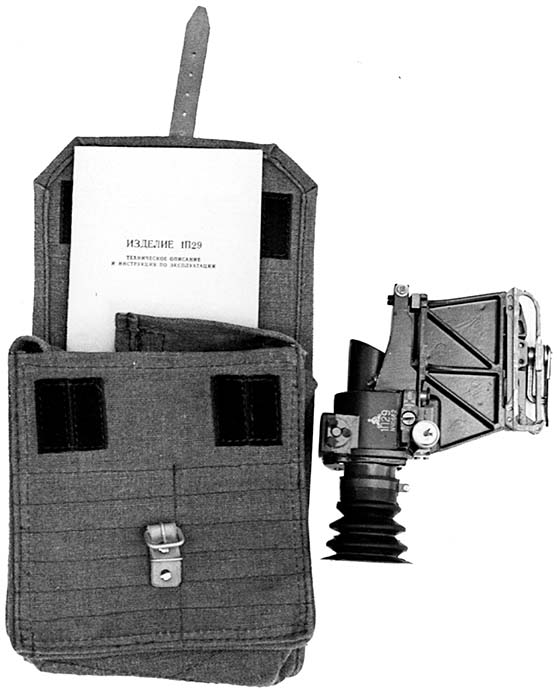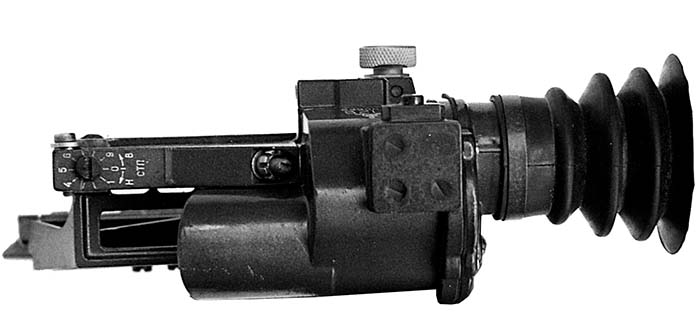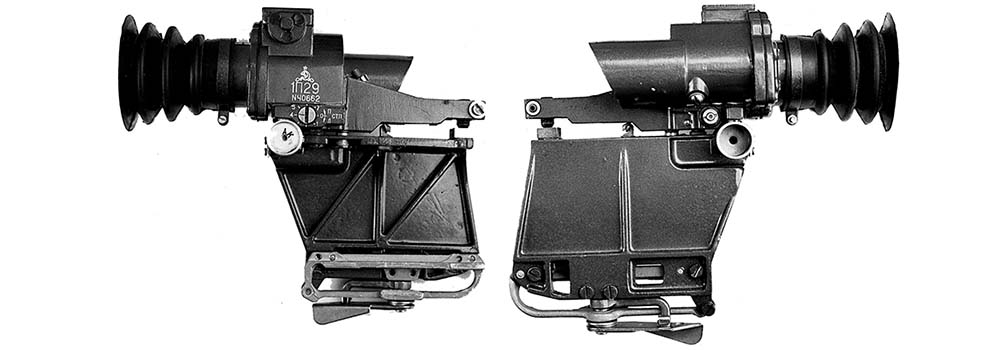By Janne Pohjoispää
Since the 1960’s sighting devices specifically designed for assault rifles have been developed for many NATO armies and other western powers. In the mid-1980’s the Soviets fielded their own version of an assault rifle optical sight, known as the 1P29. Although recently recognized mounted on top of the new Russian assault rifle AN-94 (see SAR March 1998) and therefore nicknamed as “the Nikonova’s Eye”, the design is not new and not originally Russian. The 1P29 appears to be a very close copy of the British L2A2 or the SUIT (Sight Unit, Infantry Trilux) sight, originally developed by RARDE (Royal Armament Research and Development Establishment) and produced by AVIMO Ltd. The 1P29 sight is currently in service with the Russian army and it seems to be available – either officially or unofficially – to civilian purchasers in Russia.

The 1P29 sight, known also as the USP-1, is currently issued for Russian infantry small arms including the 5.45 x 39 mm caliber AK-74 series assault rifle and RPK-74 LMG and the 7.62 x 54 R caliber PKM GPMG. Not every AK, RPK or PKM has a provision for mounting an auxiliary sighting device, but arms furnished with a scope rail mounted on the left side of the receiver are known as the AK-74N, RPK-74N and PKMN. The N-series guns will also accept the 1PN58 and 1PN51 passive night sights. New generation AK-74M and AK100 series assault rifles have a scope rail as a standard feature.
The 1P29 has construction and most of its features similar to the British SUIT. It has fixed 4 x magnification with a 28 mm diameter objective. Optical part of the sight is a fully sealed and quite simple unit, constructed with a limited number of parts, including three lenses and two prisms. The configuration reveals that construction differs from conventional “see-through” riflescopes. The 1P29 employs a Porro prism principle, which means that the ocular lens lies offset from the objective lens, and the image is composed by two reversed prisms. This design is widely used with traditional-style binoculars, old-style machine gun prismatic sights, but seldom with modern small arms sights. The 1P29 has 8 degrees field of view. In other words, this means a 14 yard strip at a distance of 100 yards.
The mounting system of the 1P29 is similar to one used with other Soviet/Russian small arms optics. All current Russian small arms optical sights will be mounted on the rail at the left side of receiver, because construction of most of their shoulder weapons does not allow mounting the sight on the top of receiver. The 1P29 is fully interchangeable with the 1PN51 and 1PN58 passive night sights. Mounting the 1P29 on the PSO-1 rail is possible, but because the 1P29 rail is placed further back than the PSO-1 rail, it won’t provide good ergonomics. The 1P29 rail mounted on the gun is 0.55 inch wide. It is short in length and features a slot for a locking latch. The locking mechanism includes an eccentric cam and its operating lever. The locking mechanism used with the 1P29 and also with the new passive night sights, is more robust than the vertically moving bar employed with the PSO-1 scope. A very similar scope mount mechanism is used with the Galil sniping variation.
The standard issue AK won’t provide good ergonomics while the optical sight is used. As the 1P29 is mounted high, the configuration allows use of open sights and firearm disassembly without removing the scope, but obliges the operator to stretch his neck to see through the scope and provides no cheek rest.
The scope body is a one-piece construction machined from aluminum alloy casting. The eyepiece is a separate part mounted on the body with five screws. The joint is sealed with a rubber gasket. Most other seams are sealed with yellow wax-like packing. The scope has a detachable rubber eyeguard mounted over the eyepiece. The eye relief is very short, just 1.4” (35 mm), and there is no provision for manual focusing.
All adjustments are external. The scope is mounted over two adjustable support points by means of a strong spring. At rear, there is a cam for basic elevation adjustment. The cam is changeable and calibrated for used calibers. The 5.45 mm cam can be adjusted from 400 m to 1000 m with 100 m increments. For a 5.45 mm caliber bullet, in this authors opinion the ranges over 400 m are pure fantasy. The 7.62 mm cam is similar, but it can be adjusted from 400 m to 1200 m. Ballistic cams will be made at least for the 5.45 mm M74 AK-74, 5.45 mm M74 RPK-74, 7.62 mm M43 AKM, 7.62 mm M43 RPK and 7.62 mm M1891 PK series machine guns.
Elevation fine-tuning is done with an adjustment screw, placed at the front of the sight. The elevation screw has no clicks, but a scale with 3.6 MOA steps. The windage adjustment screw is placed at the right side of the sight, just next to the elevation cam operating knob. Unlike the elevation adjustment, the lateral adjustment screw has audible clicks. Each click will move the point of impact laterally by 0.7 MOA.

The optics of the 1P29 sight are very good in quality and more clear than, for instance, the PSO-1 optics. Generally speaking, the Russian military industry produces high quality and cost-effective optical devices. Lenses and other optical components are carefully made from high-quality glass. However, outdated mechanical construction and obsolescent electronics (in night vision equipment) will reduce their utility value.
The 1P29 has a reticle that is similar to one used with the British SUIT. It is a fixed vertical bar hanging out from the ceiling of the visual field. The bar is a transparent glass needle, and it has outlines smudged for better visibility in daylight. In dim light, the reticle appears a pale greenish color and easily stands out from the surroundings. The reticle is illuminated with a tritium gas ampoule and no batteries are needed. Although moderately radioactive, the tritium causes no harm to the operator since the gas is packed in a hermetically sealed glass ampoule. Unlike to the SUIT, brightness of the reticle is non-adjustable. Similar to the PSO-1, the 1P29 sight picture includes a range estimation scale, graduated for a 1.5 m high object. The 1P29 operator’s manual states that the AK-74 assault rifle fitted with an 1P29 scope should fire three shots out of four inside a six inch circle at a range of 100 meters (109 yds). Otherwise it should be sent for repair. No great demands for accuracy here.
The 1P29 scope comes from factory with three ballistic cams (“AK” marked for 5.45 mm M74 caliber AK-74 assault rifles, “RPK” marked for 5.45 mm RPK-74 and “PKM” marked for 7.62 mm M1891 caliber PK/PKM general purpose machine gun), adjustment tool, replacement eyeguard with mounting hardware and a Russian-language 32 page operators manual. All material is packed in green colored heavy canvas pouch.
Proper assault rifle scopes have low power magnification. Assault rifle optics should not be compared with sniper grade scopes. They are intended to improve accuracy and hit probability in fast situations as well as increase the effective range of an assault rifle, but not to turn every rifleman to a part-time sniper. The 1P29 has fixed 4 x magnification, which is actually too great for most applications where a scoped assault rifle is employed. Greater magnification is fine, if the assault rifle is used for long-range shooting. But long range shooting is not the most important role of the assault rifle. Greater magnification makes fast target acquisition more difficult and fatally handicaps the operator in fast situations.
| This article first appeared in Small Arms Review V1N12 (September 1998) |











